Acne, a common skin condition, can be a frustrating and persistent problem for many individuals. While traditional treatments often involve harsh chemicals and medications, there is a growing interest in natural and holistic approaches to managing acne. This article explores the benefits of natural treatments for acne, highlighting effective home solutions that can provide relief and promote healthier skin without the potential side effects of conventional therapies.
Natural remedies for acne have gained popularity in recent years, as more people seek out alternative therapies that are gentler on the skin and the environment. These natural solutions often utilize readily available ingredients, making them a cost-effective and accessible option for those looking to manage their acne effectively.
Key Takeaways
- Natural treatments for acne can provide effective solutions without the harsh side effects of traditional medications.
- Home remedies using natural ingredients like tea tree oil, aloe vera, and honey can help combat acne and promote healthier skin.
- Maintaining a balanced diet, managing stress, and developing a consistent skincare routine are essential for reducing acne breakouts.
- Combining natural treatments with professional guidance from a dermatologist can lead to optimal results in managing acne.
- Success stories and community support can inspire and encourage individuals to explore natural acne therapies.
Understanding Acne: Causes and Types
Acne is a common skin condition that affects millions of people worldwide. It’s often associated with adolescence, but it can also persist into adulthood. Understanding the causes and various types of acne is the first step towards finding effective botanical acne solutions and a holistic approach to acne management.
What is Acne?
Acne is a skin condition characterized by the appearance of pimples, blackheads, and other blemishes. It occurs when the pores in the skin become clogged with oil, dead skin cells, and bacteria. This can lead to the development of inflamed and infected lesions on the face, neck, chest, and back.
Common Triggers of Acne
- Hormonal changes, especially during puberty and menstrual cycles
- Excess oil production in the skin
- Clogged pores due to dead skin cells and bacteria
- Certain medications, such as corticosteroids and lithium
- Stress and anxiety
- Diet, including high-glycemic foods and dairy products
Different Types of Acne
Acne can manifest in various forms, each with its own characteristics and treatment approaches. Some of the most common types of acne include:
- Comedonal Acne: Characterized by blackheads and whiteheads, which are non-inflammatory lesions.
- Inflammatory Acne: Includes papules, pustules, and nodules, which are inflamed and can be more severe.
- Cystic Acne: Characterized by deep, painful cysts and nodules that can lead to scarring if left untreated.
- Hormonal Acne: Often occurs during hormonal fluctuations, such as during puberty, menstruation, or pregnancy.
Understanding the root causes and specific types of acne is crucial for developing effective botanical acne solutions and a holistic approach to acne management.
Benefits of Natural Treatments for Acne
As the demand for organic acne remedies and non-pharmaceutical acne treatments continues to grow, more and more individuals are exploring the benefits of natural solutions for their skin concerns. These natural approaches offer several advantages over conventional pharmaceutical options, making them an attractive alternative for those seeking gentler and more cost-effective acne management.
Fewer Side Effects
One of the primary advantages of natural acne treatments is the reduced risk of unwanted side effects. Many conventional acne medications can cause dryness, irritation, and even hormonal imbalances. In contrast, organic acne remedies derived from plant-based ingredients tend to be gentler on the skin, minimizing the likelihood of adverse reactions and allowing for a more comfortable treatment experience.
Cost-effective Solutions
Natural acne treatments often come with a more affordable price tag compared to prescription medications or high-end skincare products. Many of the key ingredients used in homemade or natural-based acne solutions, such as tea tree oil, aloe vera, and honey, can be easily sourced and incorporated into DIY remedies, making them a cost-effective alternative for those on a budget.
Environmental Safety
Choosing natural acne treatments also aligns with a growing trend of eco-consciousness. Organic acne remedies typically have a smaller environmental footprint, as they often contain biodegradable and sustainably-sourced ingredients. This approach not only benefits the individual’s skin but also contributes to a more sustainable future, making it an appealing option for those concerned about the environmental impact of their skincare choices.
“Embracing natural acne solutions empowers individuals to take control of their skin health, while also making a positive impact on the environment.”
By exploring the benefits of natural acne treatments, individuals can find effective, cost-conscious, and environmentally-friendly solutions to manage their skin concerns and achieve clearer, healthier complexions.
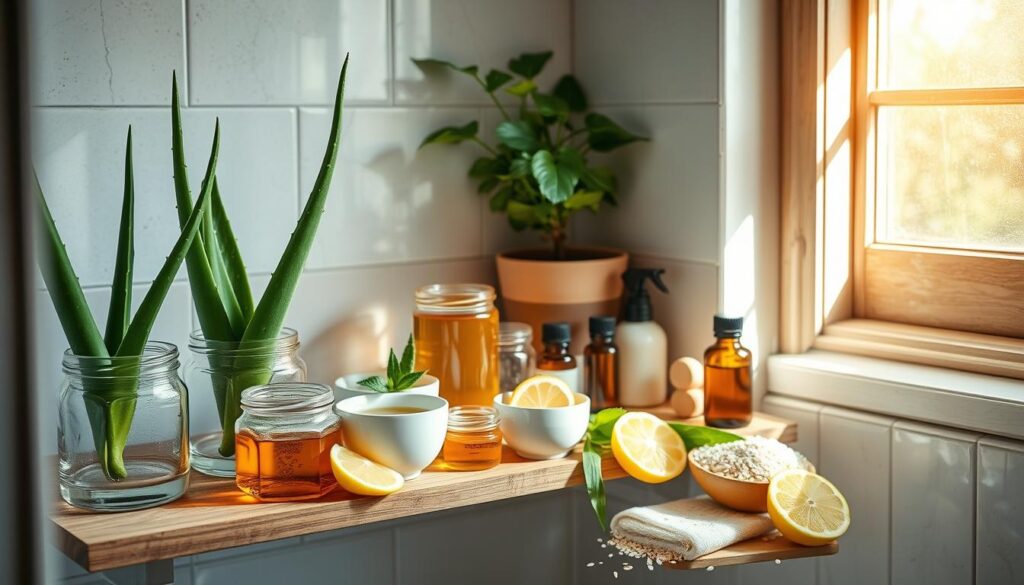
Essential Natural Ingredients for Acne Relief
When it comes to natural remedies for acne, there are several key ingredients that stand out for their proven effectiveness. Exploring the power of plant-based acne care, let’s dive into three of the most renowned natural wonders – tea tree oil, aloe vera, and honey.
Tea Tree Oil
Tea tree oil, derived from the leaves of the Melaleuca alternifolia tree, has long been recognized for its exceptional antibacterial and anti-inflammatory properties. This natural essential oil works wonders in fighting the bacterial infections that often contribute to acne breakouts. Applied topically, tea tree oil can help reduce redness, swelling, and the appearance of blemishes, making it a go-to choice for herbal acne treatments.
Aloe Vera
Aloe vera is a succulent plant known for its soothing and healing properties. Rich in vitamins, minerals, and antioxidants, aloe vera can be a powerful ally in the battle against acne. The gel extracted from the plant’s leaves has a cooling effect that can calm inflamed skin, while its natural antibacterial components help fight the root causes of breakouts. Incorporating aloe vera into your plant-based acne care routine can provide much-needed relief and nourishment for troubled skin.
Honey
Honey, a natural humectant and antimicrobial agent, is another remarkable ingredient for acne-prone skin. Its ability to hydrate and soothe the skin, while also fighting bacteria, makes it a versatile and effective option for herbal acne treatments. Honey can be used as a spot treatment or in homemade face masks to target blemishes and promote a clearer, healthier complexion.
By harnessing the power of these natural ingredients, individuals with acne can explore effective, plant-based solutions to address their skin concerns. Incorporating tea tree oil, aloe vera, and honey into your skincare regimen can be a transformative step towards achieving clearer, more radiant skin.
How to Create an At-Home Acne Treatment
Dealing with stubborn acne can be frustrating, but you don’t have to rely on expensive skincare products or harsh chemicals. By harnessing the power of natural ingredients, you can create your own effective home remedies for acne that are gentle on your skin. In this section, we’ll explore simple, DIY solutions to address various acne concerns.
DIY Face Masks
Face masks are a fantastic way to deeply cleanse and nourish your skin. Try creating a soothing clay mask with bentonite clay, which helps draw out impurities, or a honey mask to combat inflammation and promote healing. You can also mix tea tree oil into your mask for its potent antibacterial properties.
Homemade Cleansers
Harsh commercial cleansers can strip your skin of its natural oils, leading to even more acne breakouts. Instead, opt for a gentle, homemade cleanser using ingredients like aloe vera, castile soap, and witch hazel. These natural alternatives will cleanse without causing dryness or irritation.
Exfoliating Scrubs
Regularly exfoliating is crucial for clearing clogged pores and preventing future acne flare-ups. Create your own gentle, exfoliating scrub with ingredients like oatmeal, ground almonds, or sugar. These natural exfoliants will slough away dead skin cells without over-drying your complexion.
By incorporating these easy, home remedies for acne into your skincare routine, you can take control of your skin’s health and achieve a clearer, more radiant complexion. Experiment with different natural ingredients to find the perfect natural treatment of acne that works best for your unique skin type.
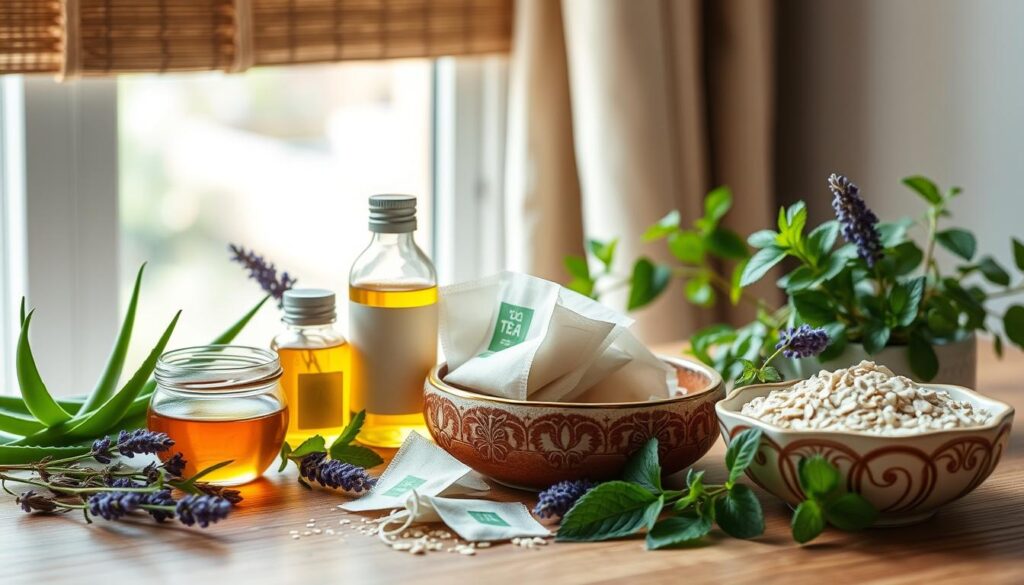
Maintaining a Healthy Diet for Better Skin
When it comes to managing holistic acne management and achieving clear, radiant skin, your diet plays a crucial role. By incorporating the right foods and nutrients, you can support your skin’s natural healing process and reduce the occurrence of natural acne cures. Let’s explore the key dietary considerations for healthier skin.
Foods to Include
- Antioxidant-rich fruits and vegetables, such as berries, leafy greens, and bell peppers, to combat free radical damage.
- Foods high in omega-3 fatty acids, like salmon, walnuts, and flaxseeds, to reduce inflammation.
- Probiotic-rich foods, including yogurt, kefir, and fermented vegetables, to promote gut health and skin balance.
- Zinc-containing foods, such as oysters, chickpeas, and cashews, to support skin cell renewal.
Foods to Avoid
- Refined carbohydrates and sugary foods, which can contribute to acne flare-ups.
- Dairy products, as they may trigger an inflammatory response in some individuals.
- Greasy, fried, and heavily processed foods, which can clog pores and exacerbate acne.
Hydration’s Role in Skin Health
Staying hydrated is essential for maintaining healthy, glowing skin. Aim to drink at least 8 glasses of water per day to keep your skin cells plump and nourished. Proper hydration can also help flush out toxins and regulate sebum production, both of which are crucial for managing natural acne cures.
“Eating a balanced, nutrient-rich diet and staying hydrated are the foundations of a holistic approach to acne management.”
By making strategic dietary choices and prioritizing hydration, you can take a proactive step towards achieving clearer, more vibrant skin. Remember, a healthy diet is a key component of a holistic acne management plan.
Lifestyle Changes to Reduce Acne Breakouts
Achieving clear, blemish-free skin is not just about finding the right alternative acne therapies or organic acne remedies. It also requires addressing underlying lifestyle factors that can contribute to persistent breakouts. By making a few key adjustments to your daily routine, you can take a proactive approach to managing acne and promoting healthier skin.
Stress Management Techniques
Stress is a common culprit behind many skin problems, including acne. When the body is under stress, it produces excess cortisol, a hormone that can stimulate the overproduction of sebum, leading to clogged pores and acne flare-ups. To combat this, try incorporating stress-reducing activities into your day, such as meditation, yoga, or deep breathing exercises. Taking time to unwind and relax can work wonders for your skin’s overall health.
Proper Sleep Habits
Adequate, quality sleep is essential for maintaining balanced hormones and promoting skin cell regeneration. Aim for 7-9 hours of sleep each night, and establish a consistent sleep routine by going to bed and waking up at the same time every day. Avoiding blue light from screens before bed and creating a sleep-conducive environment can also help you achieve the restful slumber your skin needs.
Skincare Routine Essentials
- Cleanse gently: Use a mild, non-irritating cleanser to remove excess oil, dirt, and impurities without stripping the skin.
- Exfoliate regularly: Incorporate a gentle exfoliating scrub or mask a few times a week to slough off dead skin cells and unclog pores.
- Moisturize: Choose a lightweight, oil-free moisturizer to hydrate the skin without clogging pores.
- Protect with SPF: Apply a broad-spectrum sunscreen daily to shield your skin from harmful UV rays, which can worsen acne.
By making these lifestyle changes and incorporating natural, effective acne-fighting ingredients into your routine, you can take control of your skin health and reduce the frequency and severity of breakouts.
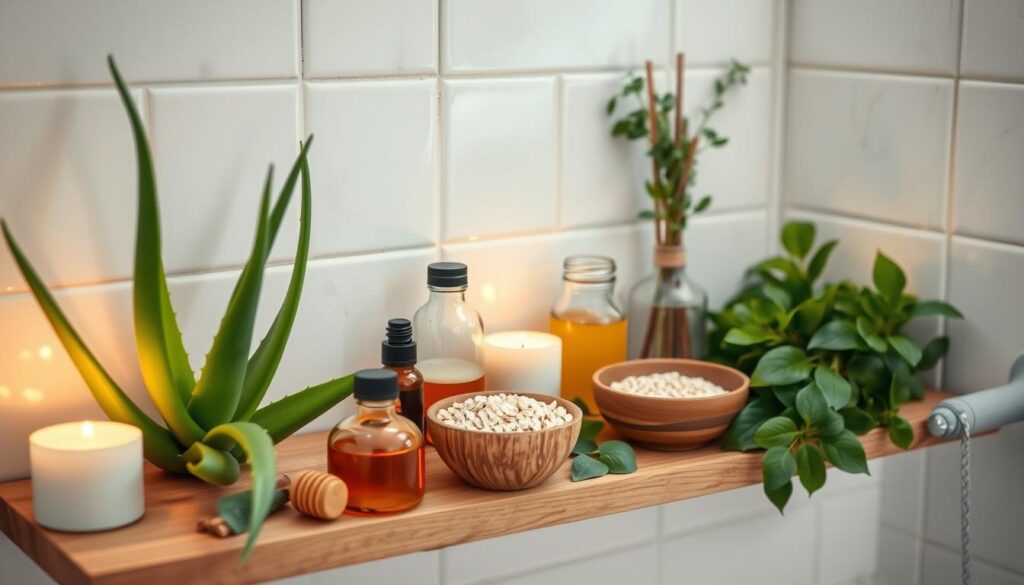
| Lifestyle Factor | Impact on Acne | Recommended Changes |
|---|---|---|
| Stress | Increased cortisol production can lead to excess sebum and clogged pores. | Incorporate stress-reducing activities like meditation, yoga, or deep breathing exercises. |
| Sleep | Lack of sleep can disrupt hormonal balance and impair skin cell regeneration. | Aim for 7-9 hours of quality sleep per night and establish a consistent sleep routine. |
| Skincare Routine | Improper cleansing, exfoliation, and moisturization can exacerbate acne. | Use gentle, non-irritating products and incorporate essential steps like cleansing, exfoliating, and moisturizing. |
By making these lifestyle adjustments and incorporating organic acne remedies into your daily routine, you can take a holistic approach to managing your skin’s health and reducing the frequency and severity of breakouts.
Natural Remedies: A Closer Look
When it comes to addressing botanical acne solutions and herbal acne treatments, there are several natural remedies that have gained attention for their potential benefits. Let’s take a closer look at three popular options: witch hazel, green tea, and apple cider vinegar.
Witch Hazel
Witch hazel is a plant-based astringent that has long been used in skincare products. It is known for its ability to tighten pores, reduce inflammation, and soothe irritated skin. Witch hazel can be particularly effective in addressing acne-prone areas, as it helps to control excess oil production and prevent breakouts.
Green Tea
Rich in antioxidants and polyphenols, green tea has been explored for its potential in treating and preventing acne. When applied topically, the compounds in green tea can help reduce inflammation, fight bacteria, and regulate sebum production. Drinking green tea regularly may also provide additional benefits for overall skin health.
Apple Cider Vinegar
Apple cider vinegar is a versatile natural remedy that has been touted for its ability to balance the skin’s pH, reduce inflammation, and inhibit the growth of acne-causing bacteria. Diluted in water, apple cider vinegar can be used as a toner or spot treatment to target specific blemishes.
These botanical acne solutions and herbal acne treatments offer a natural approach to managing acne and improving overall skin health. By incorporating them into a well-rounded skincare routine, individuals can explore effective and gentle alternatives to traditional acne medications.
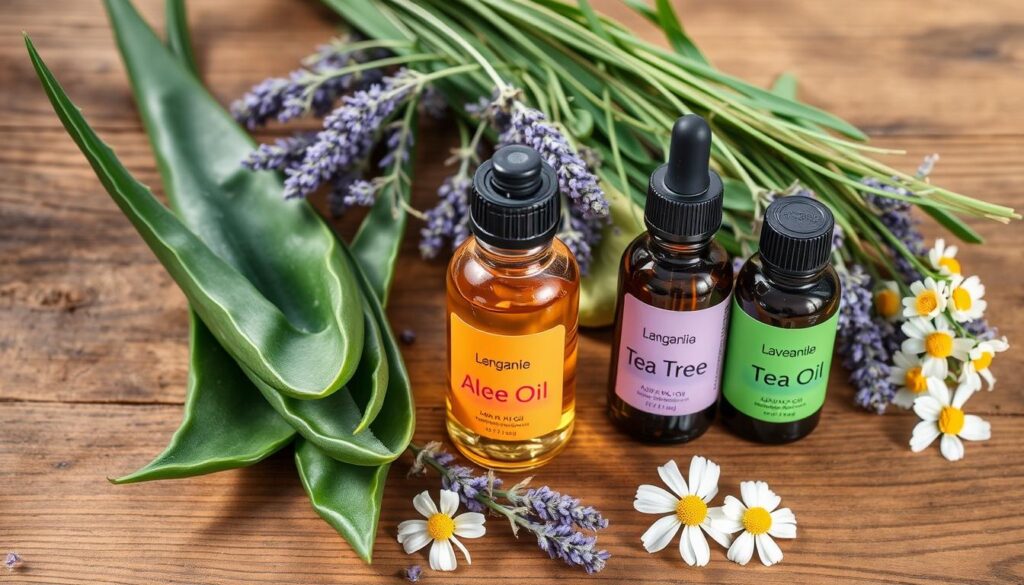
When to Seek Professional Help
While natural and plant-based acne treatments can be highly effective, there are instances when seeking professional medical advice is necessary. Understanding the signs that indicate the need for a dermatologist’s expertise can help ensure you receive the appropriate care for your skin’s wellbeing.
Signs You Need a Dermatologist
- Severe or cystic acne that does not respond to over-the-counter non-pharmaceutical acne treatments
- Persistent or worsening breakouts despite consistent use of plant-based acne care
- Acne that leads to scarring or hyperpigmentation
- Sudden changes in acne type or location, such as adult-onset acne
Combining Natural Treatments with Prescription Medications
In some cases, a combination of natural and professional treatments may be the most effective approach. A dermatologist can evaluate your skin condition and recommend prescription medications, which can be used in conjunction with your non-pharmaceutical acne treatments for optimal results. This collaborative approach can help address the root causes of your acne while minimizing side effects.
Ongoing Skincare Management
Maintaining healthy skin requires a long-term commitment to a consistent skincare routine. Even after your acne has cleared, it’s essential to continue using plant-based acne care products and adopting lifestyle habits that support skin health. Regular check-ins with your dermatologist can help you fine-tune your regimen and address any new concerns that may arise.
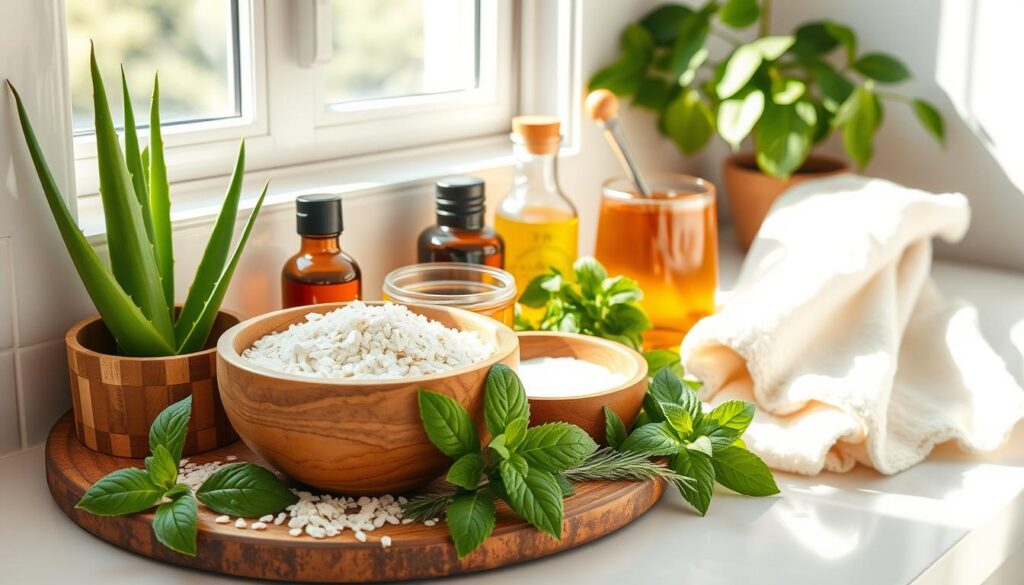
By recognizing when professional help is needed and integrating natural and prescription treatments, you can achieve lasting control over your acne and enjoy the confidence that comes with clear, healthy skin.
Success Stories: Real People, Real Results
As the saying goes, “seeing is believing.” When it comes to natural treatments for acne, nothing speaks louder than the real-life success stories of individuals who have found relief through these holistic approaches. From testimonials highlighting the efficacy of natural remedies to before-and-after comparisons showcasing the remarkable transformations, this section sheds light on the power of natural acne solutions.
Testimonials of Natural Treatment Efficacy
Countless individuals have shared their personal experiences with natural acne treatments, praising the remarkable results they’ve achieved. “After struggling with persistent breakouts for years, I decided to try a natural approach,” says Sarah, a 27-year-old from Seattle. “I started incorporating tea tree oil, aloe vera, and a honey-based face mask into my routine, and the difference was astounding. My skin has never looked better.”
Before and After Comparisons
Visuals can often speak louder than words, and the transformative power of natural acne treatments is no exception. Numerous before-and-after photos have surfaced, showcasing the remarkable improvements in skin clarity, texture, and overall appearance. “I was so self-conscious about my acne, but after just a few weeks of using homemade cleansers and exfoliating scrubs, the difference was night and day,” shares Emily, a 22-year-old from Chicago.
Community Support and Resources
The journey to clear, healthy skin doesn’t have to be a solitary one. There are thriving online communities and resources dedicated to providing support, guidance, and inspiration for individuals seeking natural acne solutions. From informative blogs to interactive forums, these platforms allow people to connect, share their experiences, and learn from one another’s successes. “Finding this community has been a game-changer,” says Liam, a 30-year-old from Boston. “The advice and encouragement I’ve received have been invaluable in my quest for clear, blemish-free skin.”